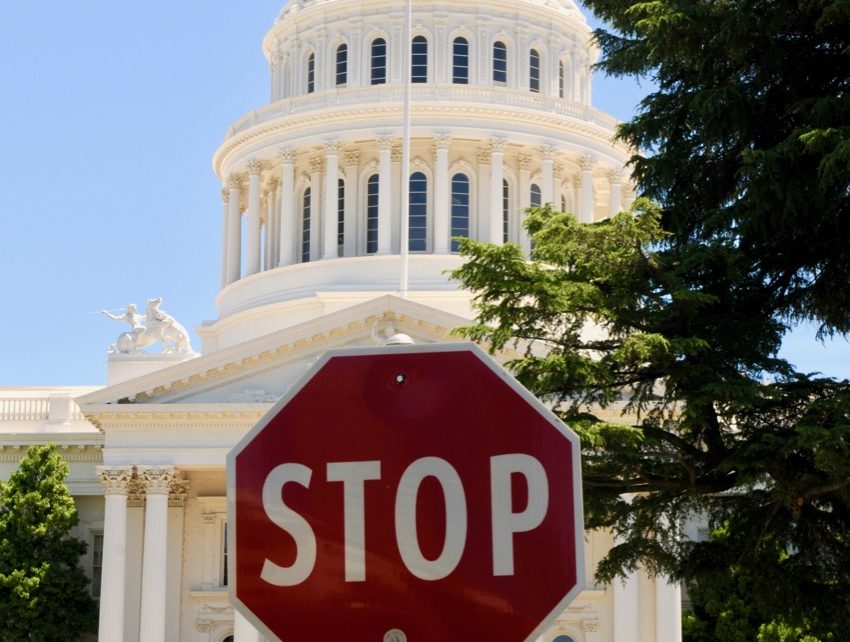
California State Capitol. (Photo: Kevin Sanders for California Globe)
Is California About to Help Businesses?
‘They see now that the gravy train is – potentially – about to come to an end’
By Thomas Buckley, June 25, 2024 8:00 am
It has been a long time since that headline has been written, but it just might be accurate.
Gov. Gavin Newsom, legislative leaders, the California Labor Federation, and the California Chamber of Commerce have agreed on a package to reform the dreaded Private Attorneys General Act, or PAGA.
This law, enacted twenty years ago, led to a tidal wave of legal actions against California businesses by employees who claimed their workplaces were violating, or even probably, or even possibly part of the state’s 1,100 pages of labor guidelines.
There were many problems with the law, but two stood out and drove businesses batty. First, the employee who filed the claim (more accurately, the employee who called up one of the many, many lawyers making their living off of filing PAGA claims – there were more than 5,000 last year) did not have to be personally impacted by the alleged problem. Second, if the problem was actually real the business could not just fix it and be done with the claim – it had to make its way through the courts and/or mediation and/or the state labor bureaucracy.
The new reform package changes those two particularly egregious issues. Under the proposal (there are two bills winding their way through the state house now and they are on a June 27 deadline to get to Newsom for signing,) an employee who files a claim must be affected by the alleged violation.
In a nutshell, for example, if an employee sees a problem at work it needs to actually impact the employee who files the claim.
Currently, a claim could be filed “even if the plaintiff was not personally affected by violations affecting other employees—the plaintiff just needed to prove a single Labor Code violation. This meant that plaintiffs had a very low burden in order unlock a wholesale audit of an employer’s wage and hour practices,” states an analysis of the bill by the Seyfarth Law Firm. “This provision will go a long way in containing the scope of PAGA actions from the outset. It will be an incredibly important tool for employers to argue that the plaintiff’s claims should be adjudicated first in order to ascertain the scope of the claims for the representative group.”
In other words, an employee could allege a practically random 50 things wrong and if only one actually stuck, the claim would go forward.
Over the years, PAGA claims have drained hundreds of millions of dollars from state businesses with – at least – one-third of that going to lawyers, no matter how much work they actually did.
The other key reform is that a business will have time to fix the problem and show the state it was fixed, short circuiting court and/or future state actions.
“For small employers (defined as under 100 employees during the relevant period), the employer can notify (the state) that it would like to cure the alleged violations. The agency will then arrange a settlement conference with the plaintiff and employer in an attempt to reach an early resolution for the matter, like the conferences held by the Labor Commissioner for individual wage claims, Seyfarth wrote. “While it remains to be seen how the courts will handle these new requests for Early Neutral Evaluations, it will likely put an onus on plaintiffs to provide more than boilerplate allegations in their PAGA notices.”
There are a number of other provisions, such as reining in costs and fines and such – but just these two aspects will make a great deal of progress in the fight to control overly litigious lawyers and employees.
“The opportunity to cure is big,” said Tom Manzo, CEO of the California Business and Industrial Alliance (CABIA). ‘We’re excited to see it.”
Manzo’s group tracks the number of PAGA claims filed each week and he noticed something very interesting last week: typically, said Manzo, if he saw a week with more than 200 claims he would think its unusually high – last week there 665 claims, the highest number ever.
This spike is a direct result, said Manzo, of word getting out that PAGA reform was imminent and people wanted to get their claim – no matter how feeble, no matter how boilerplate – in before it takes effect.
“They see now that the gravy train is – potentially – about to come to an end,” Manzo said.
According to the CalChamber, “(A) review of PAGA case data demonstrates that the law benefits trial attorneys, not workers. The current average payment that a worker receives from a PAGA case filed in court is $1,300, compared to $5,700 for cases adjudicated by the state’s enforcement agency. Even though workers are receiving higher awards in state-adjudicated cases, employers are paying out 29% less per award. This is likely because of the high attorney fees in PAGA cases filed in court. Attorneys usually demand a minimum of 33% of the workers’ total recovery, or $372,000 on average, no matter how much legal work actually was performed.”
“PAGA is a primary concern of the employer community due to the financial leverage it provides to plaintiffs’ attorneys to pursue claims for minor violations of the California Labor Code,” continued the Chamber. “Questionable litigation that results in significant monetary settlements wherein the plaintiffs’ attorneys retain a majority of the money for fees and employees are provided a minimal amount is not fulfilling the stated intent of PAGA.”
Manzo is pleased but still a bit cautious. Over the years, the PAGA saga has built up a great deal of case law and exactly how the courts will handle the new provisions remains to be seen, Manzo said.
“California has done something good for employers in the state,” Manzo said. “Finally.”
For more detailed information and a review of the reform effort, the CalChamber has produced this video.
The parallel reform bills – one in each house – will be before a pair of committee Tuesday morning. Again, they have until the 27th – that’s Thursday – to be passed and signed. A spokesperson for CalChamber said they are confident of passage (hence the tone/tense of the above article.)
- Benefit Fraud Problems and Solutions - November 7, 2024
- A Little Exit Poll - November 5, 2024
- Tomorrow’s Headlines Today! - November 5, 2024





This is good news and could make a big difference for businesses who have been bombarded with and ruined by phony lawsuits. But what’s gone is gone and unfortunately there is SO MUCH MORE that needs to be chipped away in this arena by the state of California. Who knows, with any luck, maybe this will be the beginning of a new era for small business and business in general in CA. Fingers crossed.